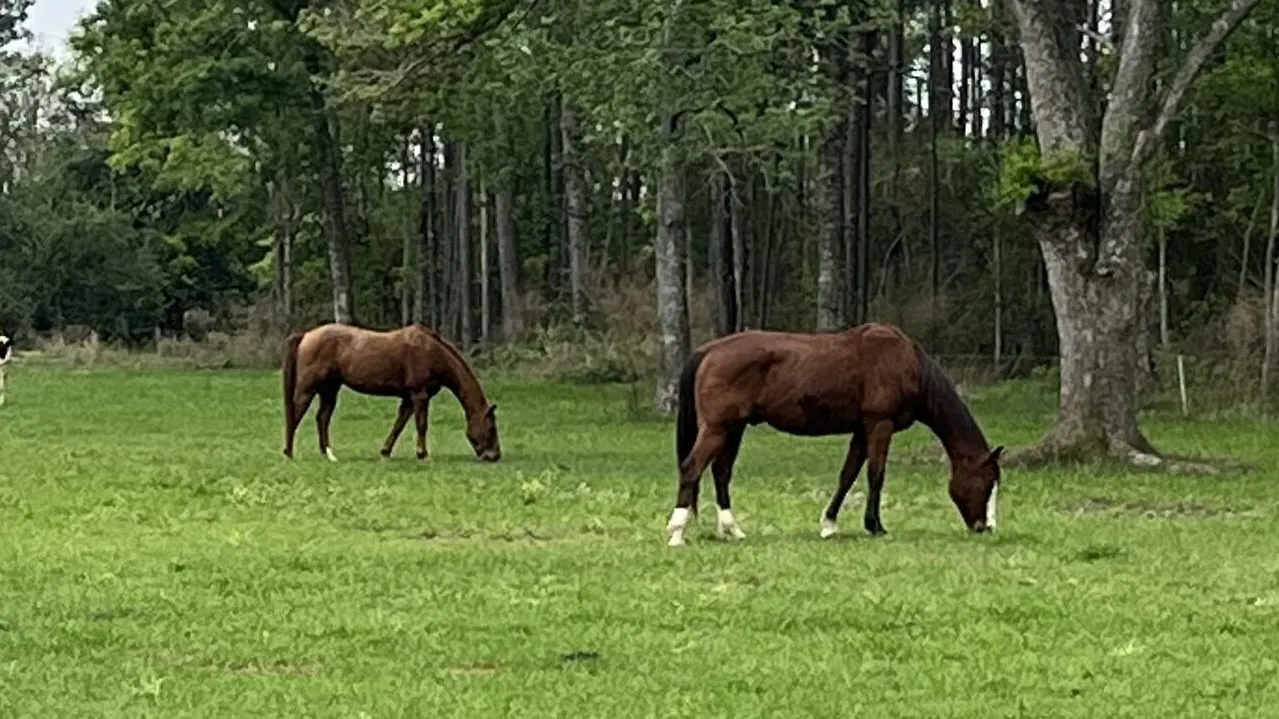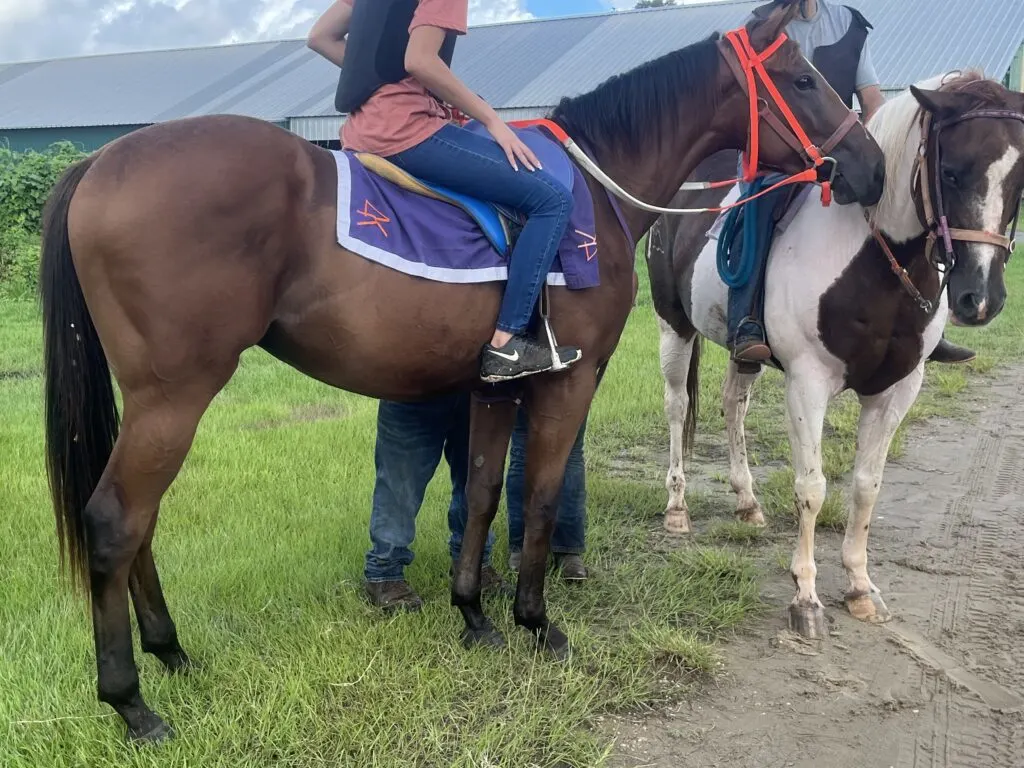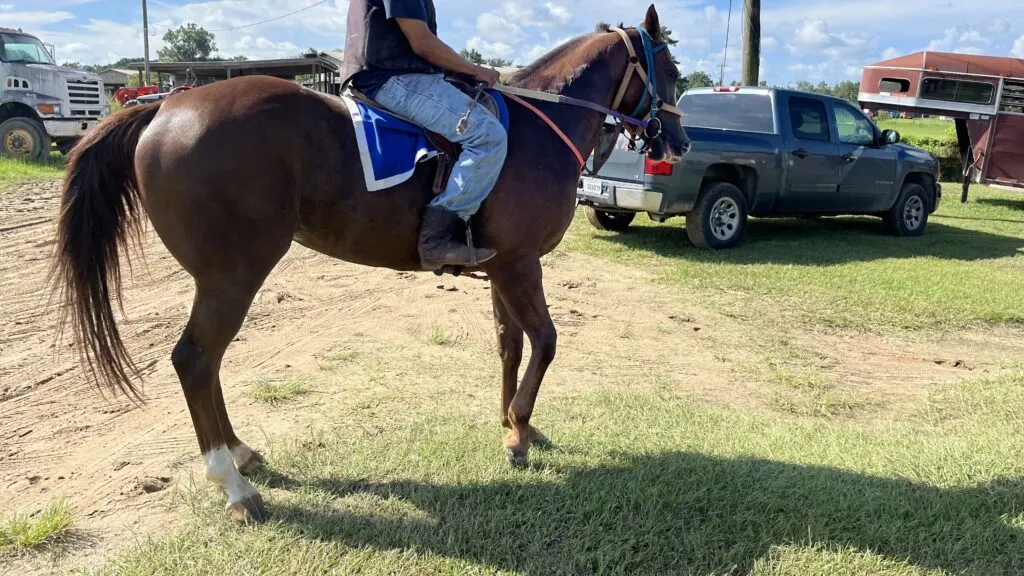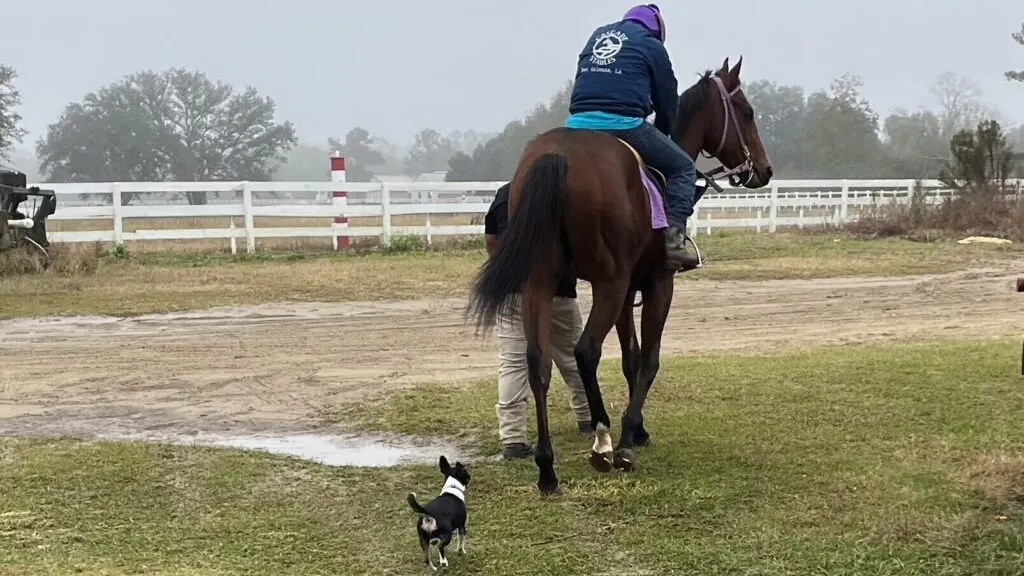Last updated: March 23, 2024
Ever wonder why some beginners quit riding while others thrive? It often starts with their first horse. I’ll introduce you to 5 breeds that have consistently turned novices into passionate equestrians. Let’s find your perfect equine partner.
My lifelong experience with various horse breeds has given me a good perspective of what newcomers need to know when choosing their first horse. So, let’s look at some of the best horse breeds for beginners and find one that aligns with your lifestyle and riding aspirations.

1. American Quarter Horse: A Solid Choice for Beginners
The American Quarter Horse is my top pick for novice riders. It’s not just about the breed’s popularity; it’s about their nature, which makes them an excellent match for someone just learning the ropes.
- Steady and Reliable: The American Quarter Horse’s calm nature is a standout trait. These horses are known for staying composed, which is incredibly reassuring for new riders. They’re forgiving when you’re still figuring things out, making them great teachers on your riding journey.
- Ideal Size: With a height that usually ranges from 14 to 16 hands, they’re comfortable for most beginners. This size makes them large enough to be versatile in various riding disciplines yet not so large as to be intimidating.
- Adaptable and Easy to Care For: One of the best things about American Quarter Horses is their adaptability. They’re as suited to a leisurely trail ride as to competitive events. Their care needs are straightforward, making them a practical choice for someone new to horse ownership.
In my experience, choosing a horse for a beginner goes beyond just picking a breed; it’s about finding a companion that grows with you. The American Quarter Horse, with its blend of temperament, size, and low maintenance, offers a solid foundation for a rewarding riding experience.
2. Morgan Horse: The Friendly Companion for Beginners
When it comes to choosing a horse that’s as eager to learn as you are, the Morgan Horse stands out. Known for their good nature and willingness to please, Morgans make ideal first horses for those stepping into the world of horseback riding.
- A Temperament That Wins Hearts: Morgans are renowned for their friendly demeanor. They’re horses that genuinely enjoy human company, making them fantastic partners for beginners. Their eagerness to please translates into a willingness to work with their riders, adapting to your learning pace with grace. Learn more about Morgan’s temperament here.
- Perfectly Sized for Confidence: With a height that typically ranges between 14 and 15 hands, Morgans are large enough to offer a stable ride without being intimidating. This size makes them especially suitable for beginners, providing a comfortable learning experience.
- Low Maintenance, High Reward: One of the Morgan Horse’s appealing traits is its low maintenance. They’re known for their robust health and longevity, which means less worry for you and more time to focus on building a bond and honing your riding skills.
Their friendly nature, manageable size, and low maintenance make Morgans a hassle-free choice for those looking for a long-term equine partner.

3. Welsh Pony: The Perfect Start for Young Riders
The Welsh Pony is an exceptional choice for young or smaller riders starting their equestrian journey. Renowned for their gentle nature and intelligence, these ponies offer a safe and enjoyable introduction to horseback riding.
- A Gentle Companion: Welsh Ponies are celebrated for their kind and intelligent temperament. They’re patient with beginners, making them perfect for children or adults just starting out. Their gentle nature ensures a positive and encouraging learning environment for new riders.
- Ideal Size for Confidence Building: Standing under 14 hands, Welsh Ponies are the perfect size for younger riders or those who may feel overwhelmed by larger horses. Their smaller stature makes them less intimidating, helping beginners to build confidence more quickly.
- Low Maintenance, High Enjoyment: Known for their hardiness, Welsh Ponies require relatively low maintenance, allowing you and your family to focus more on the joy of riding and less on the complexities of horse care. Their versatility also means they can adapt to various riding disciplines, ensuring long-term enjoyment and learning.
Welsh Ponies, gentle temperament, manageable size, and low maintenance make them ideal for those looking for a reliable and loving equine partner to start their riding adventures.
Below is a YouTube video highlighting the seven best horse breeds for beginners.
4. Tennessee Walking Horse: The Smooth Rider’s Choice
The Tennessee Walking Horse is a great choice for beginners, especially those looking for a smooth and comfortable ride. Known for their calm demeanor and unique gait, these horses offer an enjoyable and comfortable ride.
- A Calm Companion: With their gentle and friendly nature, Tennessee Walking Horses are perfect for those just starting their equestrian journey. They provide a reassuring presence that can help ease the nerves of novice riders, making every ride a pleasure.
- Smooth and Steady: These horses are celebrated for their smooth gaits, particularly the four-beat “running walk” that offers a ride like no other. Standing between 15 to 16 hands, they strike the perfect balance between size and manageability, ensuring a comfortable ride for beginners.
- Ease of Care: With low to moderate maintenance needs, Tennessee Walking Horses are ideal for those looking to enjoy the pleasures of horseback riding without the burden of extensive upkeep. Their resilience and minimal health issues mean more time spent on the trails and less time worrying about care.
For beginners focused on comfort and ease of riding, the Tennessee Walking Horse is an excellent choice. Their unique blend of calm temperament, smooth gait, and manageable care requirements make them ideal companions for those new to the world of horseback riding.
5. Friesian: The Choice for Equestrian Elegance
Friesians are the epitome of elegance in the equine world, making them a captivating choice for beginners with a penchant for grace and beauty. Known for their gentle nature and striking appearance, these horses are a joy to ride and a marvel to behold.
- A Gentle Giant: Despite their impressive size, typically standing between 15 and 17 hands, Friesians are known for their calm and accommodating temperament. They are eager to please, making them excellent companions for those new to riding, particularly in disciplines like dressage and leisure riding.
- Elegance in Motion: Friesians are celebrated for their graceful movements and powerful build, offering riders a unique combination of strength and beauty. Their presence is unmatched, making every ride an experience in itself.
- A Commitment to Care: While Friesians are undeniably stunning, they do require moderate to high maintenance, particularly in grooming. Their luxurious mane and tail demand regular attention, but for many, the effort is a small price to pay for the joy of partnering with such a magnificent breed.
For beginners drawn to the finer aspects of horseback riding and those who don’t mind dedicating extra time to grooming, the Friesian offers an unparalleled blend of beauty, grace, and gentle temperament.

What Makes a Horse Breed Beginner-Friendly? Key Traits
Choosing the right breed involves considering key traits. · Temperament, size, and maintenance needs are crucial. These factors ensure a positive, safe riding experience tailored to your capabilities and resources.
- Temperament: A calm, patient, and forgiving nature is essential for building confidence in novice riders.
- Size: A manageable size that suits the rider’s height and weight ensures a comfortable and safe riding experience.
- Maintenance Needs: Lower-maintenance breeds allow beginners to focus more on learning to ride and bonding with their horses.

Comparison Table of The Best Horse Breeds for Beginner Riders
Here’s a table outlining some of the best horse breeds for beginners, along with the traits that make them suitable choices:
| Horse Breed | Temperament | Size | Maintenance Needs | Suitability for Beginners |
|---|---|---|---|---|
| American Quarter Horse | Calm, Steady | 14-16 hands | Low to Moderate | Forgiving, versatile, easy to train |
| Morgan Horse | Friendly, Eager | 14-15 hands | Low | Adaptable, long-lived, easy to care for |
| Arabian | Intelligent, Sensitive | 14-15 hands | Moderate | Quick learners, strong human bond |
| Tennessee Walking Horse | Calm, Gentle | 15-16 hands | Low to Moderate | Smooth gait, comfortable for long rides |
| Welsh Pony | Gentle, Intelligent | Under 14 hands | Low | Ideal for young or smaller riders, versatile |
| Paso Fino | Smooth, Responsive | 13-15 hands | Moderate | Smooth gait, good for comfortable riding |
| Irish Sport Horse | Athletic, Good-natured | 15-17 hands | Moderate | Suitable for jumping and eventing, patient |
| Friesian | Gentle, Graceful | 15-17 hands | Moderate to High | Elegant movement, suitable for dressage and leisure |

Tips for Beginner Riders
How to Overcome Fear When Riding for the First Time?
Overcoming fear when riding for the first time involves a few key steps:
- Start with Groundwork: Familiarize yourself with the horse from the ground. Spend time grooming and leading the horse to build trust.
- Choose the Right Horse: Ensure your first ride is on a calm, experienced horse known for being good with beginners.
- Take Lessons from a Professional: A knowledgeable instructor can provide guidance, reassurance, and techniques to help you feel more secure.
- Go at Your Own Pace: Don’t rush. Start with short, simple sessions and gradually increase the duration and complexity of your rides.
- Focus on Breathing: Deep, steady breaths can help reduce anxiety and relax you.
- Visualize Success: Positive visualization techniques can help build confidence and reduce fear.
- Ride with a Buddy: Having a friend or instructor with you can provide additional comfort and security.
Remember, it’s normal to feel nervous. With time, patience, and practice, confidence will grow, transforming fear into enjoyment.

What Are the Signs of a Good Beginner Horse?
A good beginner horse typically exhibits the following signs:
- Calm Temperament: They remain steady and unflappable, even in unexpected situations.
- Patience: They tolerate beginner mistakes without becoming agitated or nervous.
- Forgiving Nature: They don’t overreact to incorrect cues or commands.
- Consistent Behavior: They behave predictably, providing a sense of security for the rider.
- Good Health and Soundness: They are free from health issues that could affect their behavior or performance.
- Suitable Size: They are a manageable size for the rider, not too tall or intimidating.
- Training: They are well-trained, understanding basic commands and cues, making them easier to control.
- Experience with Beginners: They have a history of working well with novice riders.

FAQs on Horse Breeds for Novice Riders
What is the best horse breed for a novice rider?
The American Quarter Horse is often recommended for novice riders due to its calm temperament, versatility, and ease of training. It is a forgiving horse breed for beginners.
How important is the size of the horse for a beginner?
Size is important as it affects the rider’s comfort and control. Beginners might prefer smaller to medium-sized horse breeds for easier handling and a less intimidating experience.
Are there low-maintenance horse breeds suitable for beginners?
Yes, breeds like the Morgan Horse and Welsh Pony are known for their hardiness and relatively low maintenance, making them suitable for beginners.
What is the best horse breed for barrel racing?
The American Quarter Horse is commonly considered the best horse breed for barrel racing due to their speed and agility. However, any horse breed can participate, and many other breeds find success.

Conclusion: Best Horse Breeds for Beginners
Choosing your first horse is the start of an exciting journey into the equestrian world. This choice is deeply connected to your lifestyle, riding goals, and the kind of experiences you’re looking to have. The right horse can turn riding from a simple activity into a lifelong passion.
Over the years, as I’ve selected horses for my children and other beginners, I’ve seen how the right match can make all the difference. It’s about understanding what makes a horse suitable for a novice and how that aligns with the rider’s needs.
I invite you to share your experiences or questions in the comments below. Whether you’re just beginning your journey or are in the process of choosing your first horse, your insights can help others. And if you’ve found this guide useful, consider sharing it on social media or signing up for our newsletter for more tips on horse breeds and care.
Remember, the journey to finding the right horse is as important as the destination. With the right approach and some patience, you’re on your way to a rewarding partnership with your horse. Welcome to the equestrian world, where your adventure is just beginning.
Additional Resources
For those wanting to learn more about horse behavior, temperament, and the dynamics between rider and horse, here are two valuable studies that provide insightful information:
- Effects of Rider Experience Level on Horse Kinematics and Behavior: This study explores how the experience level of riders influences horse behavior and movement. It’s a fascinating read for beginners and experienced riders alike, offering insights into how we can improve our riding techniques for the betterment of our equine partners. Read the study here.
- Equine Misbehavior and Its Relationship to Temperament and Rider-Induced Stress: This research delves into the reasons behind equine misbehavior, examining the links to temperament and the stress horses experience from their riders. It’s an essential resource for understanding how our actions and emotions impact our horses, guiding us toward more effective training methods. Access the full study here.
